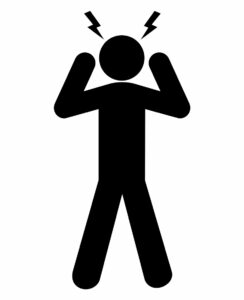Whether the score you earned makes you want to jump for joy or curl up into a ball, learning from your graded work is an incredibly valuable opportunity. Do not, repeat DO NOT, immediately toss or file away the test or essay you just got back! Here’s what to do instead.

Ask yourself honestly: “Why did I lose points here?” and “What is the correct answer, and why?”
Depending on your answers, here’s what you can do next:
If you misread the question…
… or the answers on a multiple-choice type of question, or you made a simple calculation error. Before the next test:
- Try taking practice tests under actual testing conditions: same time of day and location if possible, same amount of time and length of test, calculators or not, open/closed notes, etc. This can help you gain accuracy and learn to better focus your attention during exams.
- When you are doing practice problems, have a little conversation with yourself before you jump into answering a question. Tell yourself in a fully articulate thought, or jot on a note somewhere, what exactly the question is asking.
- For problem-solving questions: write out all the variables you are given; determine what units a reasonable answer would be in before you attempt to solve the problem; and get in the habit of doing a quick “does this make sense?” check on your answers.
If you have NO IDEA why you lost points…
… or what the correct answer is. Go back through your study material—is the answer there?
- Yes, the answer is in the study materials or course content, but you didn’t remember it at the test.
- Add “Blank Page Testing” to your study repertoire. This will help you uncover what you do and don’t know—before the test—and allow you to focus your studying on the topics you have a weaker grasp on.
- Get a study partner, and quiz each other before the next test.
- No, you really never saw this before in your study materials or in the course content.
- Are you sure? On exams students are often expected to apply familiar material in slightly different formats. How can you get ready to do that?
- When you are studying, change a variable or condition in a practice problem or example you were given.
- Try to come up with your own test questions based on practice problems you were given… but different. Exchange and discuss your own questions with your study partners.
- If you are still confused, go see your professor or TA at office hours. If office hours are often busy, it’s ok email them to see if you can set up a different time. Let them know that you are debriefing your recent exam so you can learn how to do better next time, you are specifically still confused about topic X and are hoping to clear that up, could you please set up a time to meet with them to discuss it.
You knew the answer…
… but during the test you were too stressed to think straight. Get help!
- Learn more about academic anxiety and how to deal with test anxiety.
Cornell Health has tons of great ideas about how to manage your stress to thrive, and there are many other resources on basic stress management tips that students may find helpful.
There was a grading error…
… and you think you should not have lost points. After you have triple-checked that hypothesis:
- Check what the regrade or grading error policy is for that class. Some classes have a clearly outlined regrade policy, others don’t, and a couple may not allow regrades. Keep in mind that if you request a regrade, the entire test may be reviewed.
- Of course, under no circumstances should you mark up or change in any way the answers on your test if you are planning to submit for a regrade, so be careful about taking notes on your returned exam—make a copy if you want to jot anything on the test paper itself. This is a violation of the academic integrity code. You can make a copy to mark up if you would like.
- Email the professor or TA with a description of why your answer was correct. In your email:
- Yes: be clear and succinct
- Yes: express humility.
- Yes: be open to the fact that you may not be correct.
- No: Whining, grubbing, or expressing righteous indignation regarding this potential grading error (see 1, 2, and 3 above).
But I totally bombed (this happens)
Did you know this is more common than you may think? When the LSC asked successful Cornell students if they’ve ever struggled or been totally lost or confused, almost all of them told us they experienced that. It’s notable that most of these successful students also told us that at their moments of extreme challenge, they held on to the completely incorrect thought that they were the only ones struggling. The research on “Social Belonging” echoes what we hear from students: when things are hard it’s not uncommon to feel alone. It’s important to know that you are in fact not alone in this struggle, and that things really do get better.
Is it hard to pick yourself up, brush yourself off, and figure out how to move forward after getting a grade you are really not happy with? Yup, it can be hard. But growing from mistakes, and considering and trying out new approaches, is what true learning is all about. Learning—that exciting lightbulb “ah-ha” moment when things finally click —comes from struggle, so don’t shy away even if it’s not comfortable. In fact, right now it’s especially important to dig in and learn about what went wrong for you on this test, so you can turn things around.
 If you are wondering what it will take, or if it even is possible to turn things around this semester, reach out and ask. Both your professor and your academic advisor will have useful information, and the Learning Strategies Center has tons of ideas about new ways you can try to approach your studying.
If you are wondering what it will take, or if it even is possible to turn things around this semester, reach out and ask. Both your professor and your academic advisor will have useful information, and the Learning Strategies Center has tons of ideas about new ways you can try to approach your studying.
Remembering your big-picture goals and your values is a centering experience and can provide much needed-perspective in challenging times.

